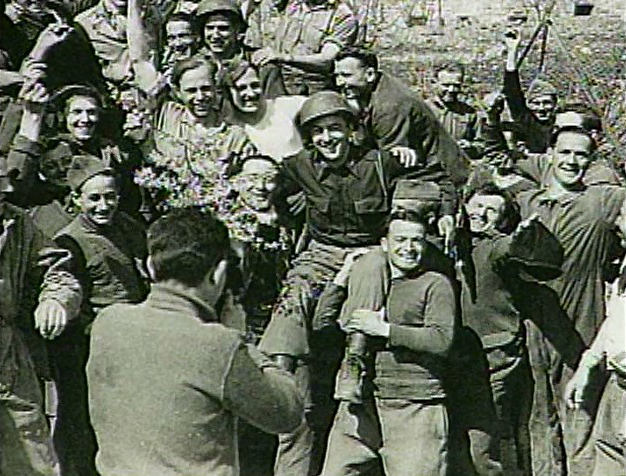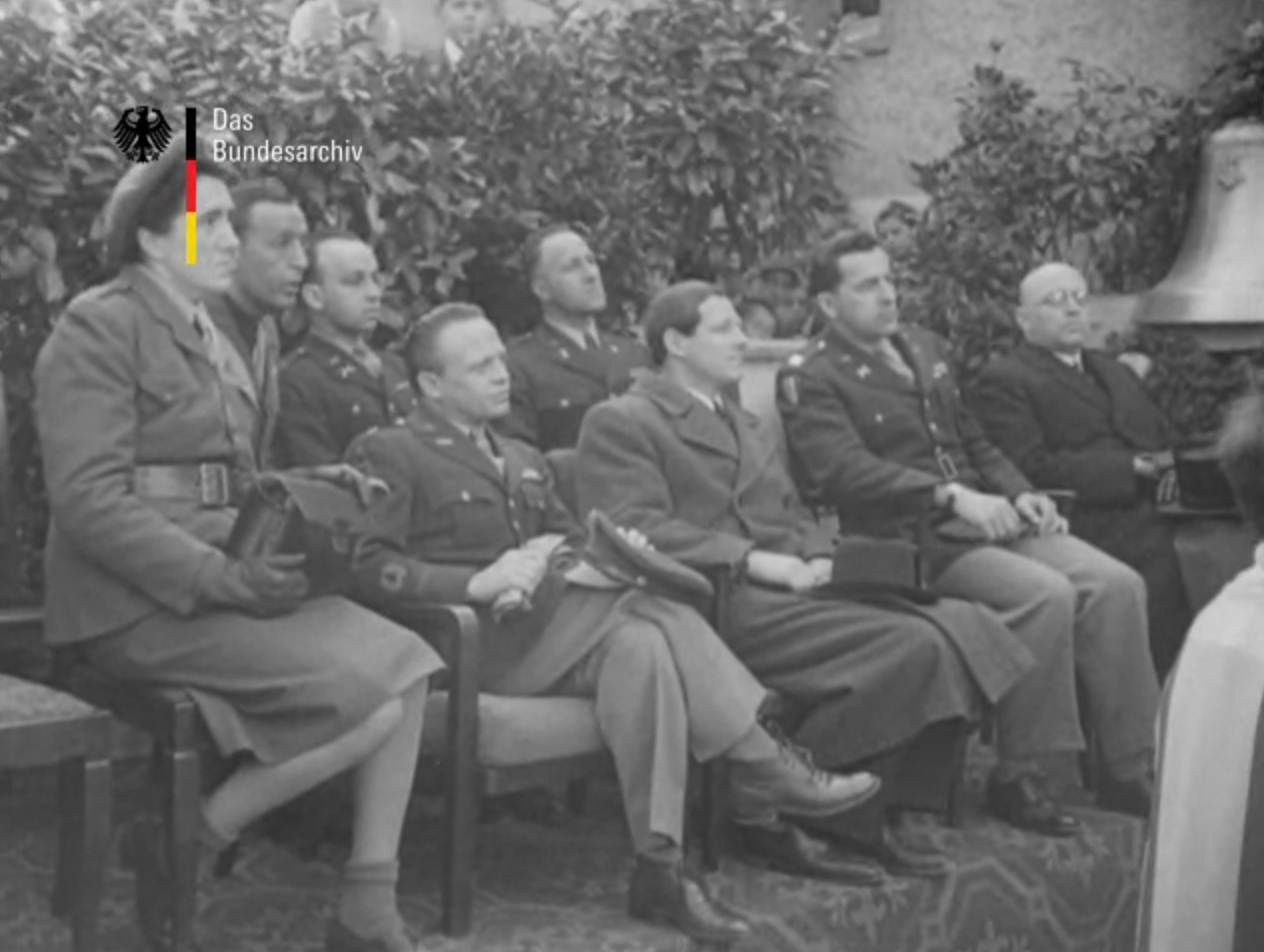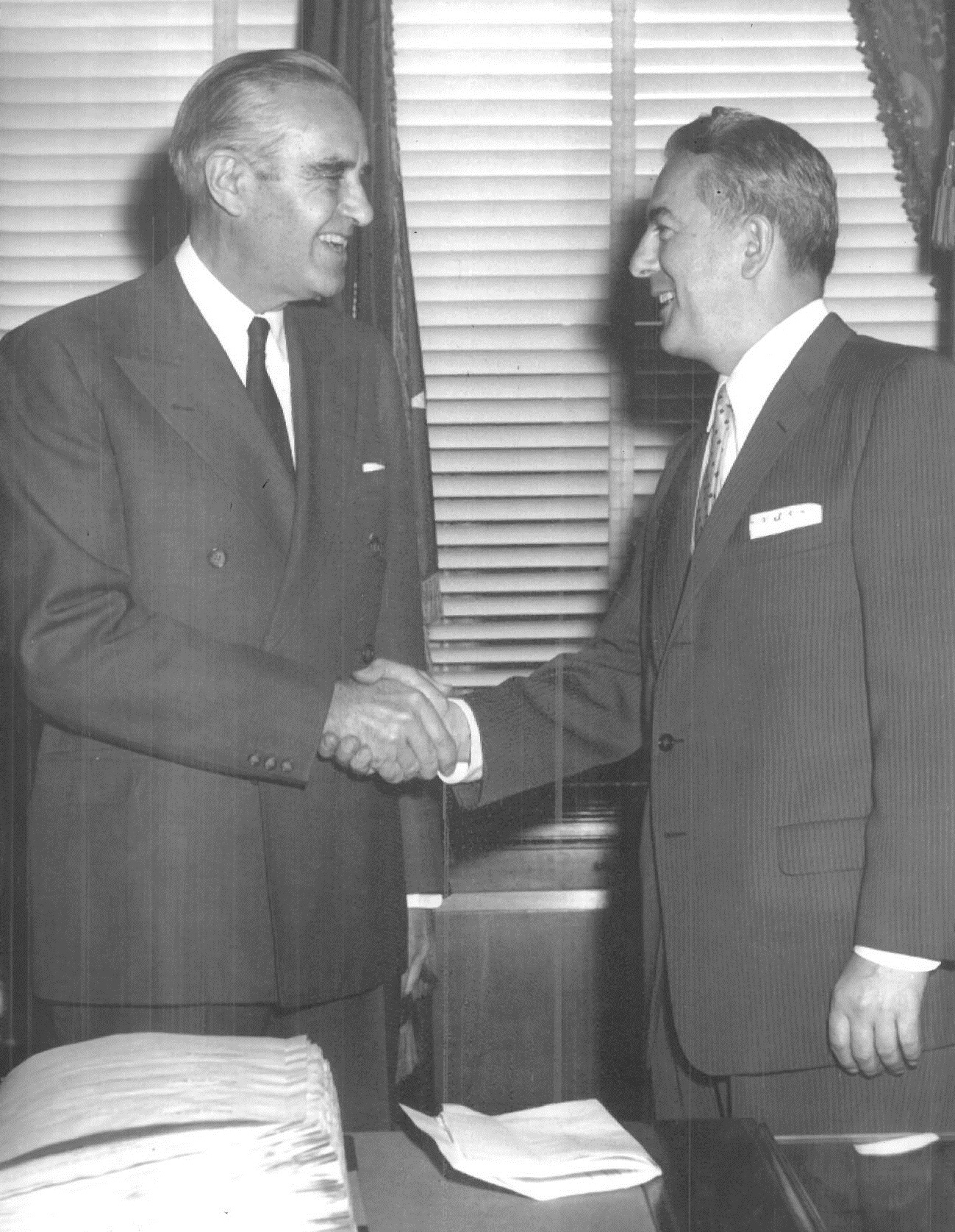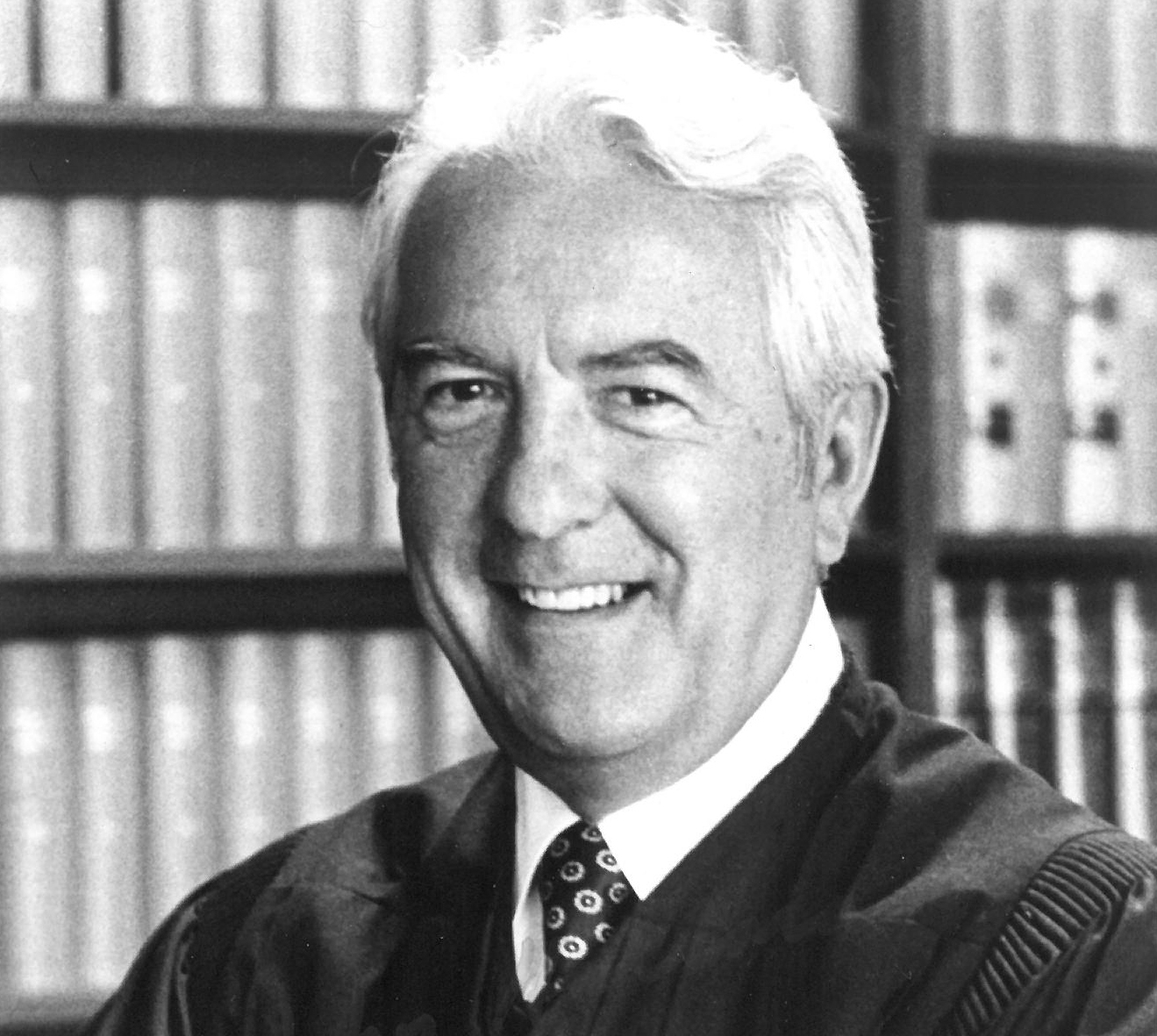This post was written by John J. Halloran, Jr., a Trustee Emeritus of the Historical Society of the New York Courts and a Law Clerk to Judge Jasen in 1984 and 1985. Mr. Halloran extends his appreciation to Prof. Vincent Bonventre (Senior Law Clerk to Judge Jasen from 1983-1985), and Prof. John Q. Barrett (Historical Society Trustee and Board member at the Robert H. Jackson Center in Jamestown, New York) for their insightful comments upon this post.
Michael B. Powers, Law Clerk to Judge Jasen (1982-1984) and Trustee Emeritus of the Society, interviewed Judge Jasen in 2005. He, and the law firm of Phillips Lytle LLP, have graciously given the Society permission to feature this video on the Oral History section of our website. This interview includes vivid photographs of Judge Jasen’s experience in Germany. View this oral history here.
Introduction
In 2015, our Historical Society celebrated the centennial of the birth of Matthew J. Jasen, who served as a Judge of the Court of Appeals from 1968 through 1985. At that time, we noted Judge Jasen’s service as a United States Judge in post-war Germany. At the invitation of the Historical Society, it is my privilege to expand upon the historical record of Judge Jasen’s experience in Europe in the 1940s, which exposed him to the atrocities of what came to be understood as the Holocaust — the systematic, bureaucratic, state-sponsored persecution and murder of six million Jews by the Nazi regime and its collaborators. For Judge Jasen, this was a searing experience that was the foundation of his jurisprudence and steadfast commitment to the rule of law.
War-Time Service in Europe
Matthew J. Jasen was admitted to the New York Bar in 1940 and, after engaging in private practice in Buffalo, NY, enlisted in the U.S. Army in January 1943. Subsequent to basic training and officer candidate school (OCS), he received his commission as a Second Lieutenant (Artillery) on September 30, 1943. He was selected for the military government civil affairs training program (G-5), which was part of the U.S. government’s planning for the allied occupation of Germany, should that event occur. During full day sessions, he intensively studied German language, culture, history, and financial institutions for six months at Harvard University’s School of Civil Affairs. It was the equivalent of two years of college. He continued his studies in German culture in Manchester and Shrivenham in the United Kingdom.
Upon the completion of his training, Judge Jasen served for three years with the Seventh Army in Europe and participated in three major campaigns with a Spearhead Detachment as a Military Government Officer. After the town of Saint-Lô in France was liberated by allied troops in 1944, and it was believed to be relatively safe for military government officers to embark upon their duties, Judge Jasen began his service as a civil affairs officer in towns in France, Belgium, and Luxembourg. In that capacity, he worked in cooperation with local officials to ensure the delivery of basic municipal services, including water, telephone, and electricity.
Thereafter, Judge Jasen and his detachment entered Germany, which was subject to military control. While on a reconnaissance mission to set up a government in Augsburg, Germany, his detachment helped liberate an abandoned prisoner of war camp, and grateful ex-prisoners celebrated their freedom by tossing Judge Jasen in the air — an image that was captured by a British photographer and later published. Judge Jasen, in characteristically modest style, later told Judge Eugene Pigott: “That was about as close to getting injured during the war as I ever was — I thought they were going to drop me.”

Upon reaching his assignment in Heidenheim, Germany (April 25, 1945), Judge Jasen served for one year as a military government officer, with judicial and administrative responsibilities, including special duties in charge of trade and industry. One contemporary report described Judge Jasen’s military government service in Heidenheim: “As an MG captain, he had been responsible for the destiny of Heidenheim, which is slightly out[side] of Stuttgart. There, Captain Jasen achieved the idealistic distinction of being the first to melt a Nazi gun into the church bell from whence it came. That, to him, was poetic justice.”

Service as a U.S. Military Judge in Heidelberg
In August 1946, Judge Jasen accepted an appointment as presiding United States Judge for the Third Military Government Judicial District at Heidelberg, Germany. This appointment was made by General Lucius D. Clay (Military Governor of Germany), who waived a requirement for 10 years of prior judicial experience to allow Judge Jasen to serve. As a military government judge, he decided issues of fact and law (no jury trials) in civil and criminal cases. In the most serious cases involving so-called “general” jurisdiction, Judge Jasen served with two other U.S. military government judges: Judge Lloyd H. Rooney of Janesville, Wisconsin (assigned to Mannheim) and Judge Dillon Hartridge of Duval County, Florida (assigned to Karlsruhe).
Judge Jasen was in the “unique position of dispensing two kinds of justice — German and American.” In a 1947 interview, Judge Jasen observed: “We try to give everyone the type of court procedure they’re used to. For instance, an American doesn’t have to take the stand to testify. But once he takes the oath, he must answer all questions. On the other hand, the German law requires a man to take the stand when called. There are a number of technicalities like that I adhere to, depending on whether or not the defendant is German, in order to make everyone feel at home.” Hank Andrews of the Post Herald observed: “The justice Jasen dispenses while on leave from his Buffalo, N.Y. law firm is more realistic than poetic — but is just as sure an indication to the Germans of the way Americans handle democracy.”
During his tenure in Heidelberg, Judge Jasen exhibited his legendary work ethic. He presided over court sessions six days per week, which included an extraordinary 9,766 trials in Heidelberg. He was reversed by higher courts only three times. In 1947 alone, Judge Jasen presided over 4,736 cases, with an average of 91 trials per week. In addition to his judicial service, Judge Jasen delivered 12 lectures on comparative law at the University of Heidelberg, and in 1947, prepared studies on juvenile delinquency for which he was commended by military government headquarters in Berlin.
While in Heidelberg, Judge Jasen came to the attention of Justice Robert H. Jackson, formerly a successful lawyer in Jamestown, NY, who was then serving as U.S. Chief Prosecutor in Nuremberg, Germany. At the invitation of Justice Jackson, who had read about “Judge Jasen of Buffalo” in the widely-circulated newspaper Stars and Stripes, Judge Jasen met with Justice Jackson in Nuremberg in 1946. Judge Jasen treasured that visit. As Judge Jasen recounted in a 2002 interview with The Robert H. Jackson Center, Justice Jackson took the time to describe his “challenging” role in Nuremberg, but he also took an interest in the “young” Judge Jasen. Justice Jackson asked Judge Jasen about his future plans back home. Judge Jasen said that he was a registered Democrat and he hoped to someday serve as a Justice on the State Supreme Court. In a light moment, Justice Jackson replied: “You are not only young, but you’re naïve” — “all counties are Republican in the Eighth Judicial District.” On November 27, 1957, Judge Jasen was sworn in as a Supreme Court Justice in the Eighth Judicial District.

Governor W. Averell Harriman (left) and then-Justice Jasen at the swearing-in ceremony.
Judge Jasen’s last day on the bench in Heidelberg was September 19, 1948. As his judicial service in Germany was drawing to a close, Judge Jasen was officially commended for high and dedicated service in the interest of justice as an American Judge in Europe. He returned to Buffalo, New York in December 1948.
Judge Jasen’s Reflections
Judge Jasen’s war-time experiences in Europe and service as a United States military judge exposed him to the Nazi atrocities at Dachau and elsewhere. As he often explained, this was the catalyst for his lifelong commitment to the rule of law, and its fair and impartial application for the protection of all groups, races and nations. In his retirement speech on December 17, 1985, Judge Jasen declared:
“My tenure in Germany exposed me to a tragedy of universal implication — the horror of the Holocaust. Never in the history of mankind were so many innocent men, women and children singled out for persecution and destruction by one man and his followers. This spectacle of human evil unleashed upon the world was officially sanctioned by the Nazi government — and the courts of that country enforced this reign of terror. * * * Recognizing the moral consequences of judicial action, as well as inaction and silence, I resolved, then and there, to do my part to insure that our judiciary remained strong, and dedicated to government in accordance with the rule of law and not man. It is fidelity to the rule of law which has served, for 28 years, as the foundation of my judicial faith.”
The Historical Society has recognized this timeless speech. On May 11, 2010, the Historical Society and the United States Holocaust Memorial Museum presented a joint program at the New York City Bar Association entitled Law, Justice, and the Holocaust: Lessons for the Court Today. This program featured Judge Jasen’s speech through a dramatic reenactment by the illustrious NY lawyer Henry G. Miller. To preserve the historical record, and memorialize Judge Jasen’s passionate and indispensable lesson of remembrance, the Historical Society is pleased to provide this video of Henry Miller’s outstanding contribution to the educational mission of the Historical Society, below.
SELECTED SOURCES
Judge Jasen’s Published Remarks
Hon. Matthew J. Jasen, Remarks at the Ceremony Marking Retirement from the Court of Appeals (December 17, 1985), 66 N.Y.2d vii, ix (1985).
Hon. Matthew J. Jasen, On the Record — Recalling the Holocaust, Buffalo Courier-Express, January 1, 1982 (Credit: SUNY Buffalo State Archives & Special Collections)
Hon. Matthew J. Jasen, Recalling the Holocaust, The State University of the State of New York, State Education Department, Bureau of Curriculum Development, Vol. I, Teaching About the Holocaust and Genocide, at 3-4 (1985) (discussing the “horror of the Holocaust” and the atrocities witnessed at Dachau, and emphasizing the importance of never forgetting the lessons of this “spectacle of human evil” and “dark period in human history”).
Video Interviews with Judge Jasen
Historical Society of the New York Courts, Celebration of the Centennial of the Birth of Judge Matthew J. Jasen (October 20, 2015) (including link to Inside Albany interview with Judge Jasen by Peg Breen, December 1985) https://nylegalhistory.wordpress.com/2015/10/20/retirement-of-judge-jasen/
The Robert H. Jackson Center, Interview with Judge Matthew J. Jasen, Part I (April 15, 2002) (Early Life and World War II)
The Robert H. Jackson Center, Interview with Judge Matthew J. Jasen, Part II (July 15, 2002) (Legal career and Law Clerks (27:57))
The Robert H. Jackson Center, Interview with Judge Matthew J. Jasen, Meeting with Justice Robert H. Jackson in Nuremberg (July 15, 2002)
Welt im Film 49/1946 (German Federal Archives) https://www.filmothek.bundesarchiv.de/video/583481?q=heidenheim at 8:21-9:25 (April 29, 1946) (Heidenheim ceremonies for the consecration of church bells made from melted guns; featuring photographs of U.S. military government representatives including Judge Jasen).
Newspapers and Other Publications
Detachment G-27 Commended for Efficient Service, Military Government, Weekly Information Bulletin, 8 September 1945, at 30 (Judge Jasen’s detachment was formally commended for excellent performance in Heidenheim by Maj. Gen. Roderick R. Allen, Commanding General of the 12th Armored Division).
German 88’s Peal Anew As Church Bells on Easter, NEW YORK TIMES, April 22, 1946, at 4.
Heidenheim’s Bells, NEW YORK TIMES, April 23, 1946, at 20.
General Commission on Army and Navy Chaplains, Church Bells, THE CHAPLAIN, at 9 (October 1946) (“Three years ago the bells in the church at Heidenheim, Germany were melted to make mounts for 88 mm. guns. Last year the mounts were found and sent to Dillengen, one of the oldest bell foundries in the world. Easter morning, the bells were pealing again in the church at Heidenheim”).
Hank Andrews, Profiles in Prose: Judge Matthew J. Jasen, Heidelberg POST HERALD (May 24, 1947).
MG Tries 4,736 Cases, EUROPEAN STARS AND STRIPES, Jan. 16, 1948, at 5.
MG Judge Jasen Returning to U.S., EUROPEAN STARS AND STRIPES, Sep’t 20, 1948, at 5.
Historical Society of the NY Courts, Biographical sketch of Judge Jasen, authored by Michael B. Powers http://bit.ly/judge-jasen-bio
Law Review Articles
Hon. Albert M. Rosenblatt, A Tribute to Judge Matthew Jasen, 69 Alb. L. Rev. 391 (2006).
Hon. Eugene F. Pigott, Jr., Judge Matthew J. Jasen, 71 Alb. L. Rev. 1081 (2009).
Hon. Judith S. Kaye, Eulogy for Matthew J. Jasen 69 Alb. L. Rev. 385 (2006). (This eulogy was delivered at the funeral services for Judge Jasen on February 11, 2006, at Christ the King Chapel on the campus of Canisius College.)
A Tribute to Judge Matthew J. Jasen, 35 Buff. L. Rev. 1-38 (1986) (collecting tributes of Hon. Charles D. Breitel, Hon. Hugh R. Jones, Hon. Alan D. Scheinkman, Hon. Edward A. Sheridan, and Hon. Michael B. Powers).
Michael J. Hutter, Honor The Craft: Personal Reflections on the Judicial Legacy of the Honorable Matthew J. Jasen, 69 Alb. L. Rev. 403 (2006).
Vincent M. Bonventre, Matthew J. Jasen, 1915-2006, 69 Alb. L. Rev. vii (2006).
John J. Halloran, Jr., The Honorable Matthew J. Jasen, 69 Alb. L. Rev. 395 (2006).

